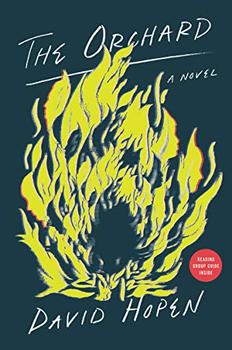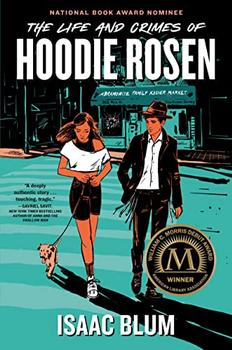Summary | Excerpt | Reading Guide | Reviews | Beyond the book | Read-Alikes | Genres & Themes | Author Bio

The protagonist of David Hopen's first novel, The Orchard, is 17-year-old Aryeh Eden, a Brooklyn boy raised in a Hasidic household where daily life revolves around strict observance of Orthodox Judaic tradition. When his father's job change forces Aryeh and his parents to relocate to Florida, the teen enrolls in a yeshiva (an Orthodox Jewish school) that is far more worldly than the one he left behind in New York. He becomes an unlikely member of the school's in-crowd, who lead him into increasingly dangerous situations, culminating in tragedy.
The first half of the novel, in which the now-adult Aryeh provides a first-person account of his formative years, is pure set-up. He introduces the audience to the heavily constrained world of Torah Temimah ("The Torah is Perfect"), a school he says is "single sexed, with a black-and-white dress code, thirty boys per grade and a reputation for functioning as an academic travesty." Later, he relates his culture shock at the new, academically challenging school in Florida, his first unsupervised coed party and his first love. Aryeh also reflects on his blossoming friendships with the four most popular boys in the neighborhood, including the mysterious Evan Stark. His love-hate relationship with Evan provides the primary tension throughout the novel, with similarities between the two (both are far more intellectual than their peers, both fall for the same girl, etc.) leading to a not-so-friendly rivalry. Even the similarity of the boys' names — Eden and Evan — is a subtle nod to how they're two sides of the same coin, a sort of yin and yang.
At about the halfway mark, the tone of the narrative changes, moving beyond a basic coming-of-age story to a fascinating exploration of how people — Jews in particular — experience the presence of God. The plot hinges on an ongoing private seminar held for the boys by Rabbi Bloom, the school's principal, during which they discuss how various philosophers viewed humanity's relationship with God. The most pivotal moment in the novel comes with a discussion of the legend of Pardes, the "paradisal orchard of Torah knowledge" (see Beyond the Book). An ensuing debate sends the five students on a trajectory that will alter the course of their lives forever.
As a coming-of-age saga, the book is entertaining, with an interesting protagonist, well-drawn characters and vividly described situations that may be uncomfortably familiar to those of us glad our youthful mistakes are behind us. What sets it apart, though, is its philosophical framing. The quest for knowledge leads to the plot's crisis, not teenage hijinks as one might expect in a typical book of this genre. This aspect transforms the novel from simply a well-written but forgettable tale into one that settles in the mind and heart, requiring rumination long after turning the last page. I suspect that many readers will want to revisit key chapters after finishing the book, and will want to find others with whom to discuss it (I know that was my reaction, at least).
As remarkable and thought-provoking as The Orchard is, there are still aspects of it I found challenging. First and foremost, countless Hebrew and Yiddish words are used throughout the narrative with no context to help with their meaning. While this may be intended for an audience familiar with these languages and Orthodox Judaism, I found my reading constantly interrupted by having to look up words, and I highly recommend reading the book on an e-reader with a comprehensive dictionary search capability to those who don't have knowledge of the vocabulary. I also felt the set-up went on for too long, and that the party scenes were more numerous and lengthy than necessary. The meat of the book occurs so late — past the halfway point in a relatively long novel — that I was getting bored by all the teenage angst (been there, done that, no desire to relive it) and almost abandoned it. Fortunately, the second half of the narrative is worth the effort — in spades.
The Orchard is an outstanding debut, and I look forward to Hopen's future efforts. The book will most likely appeal to readers who enjoy novels with depth, those they have to think about for a time after they've finished them — it compares well to Donna Tartt's debut, The Secret History. It would also make an excellent choice for book groups that tackle weightier works.
![]() This review
first ran in the November 18, 2020
issue of BookBrowse Recommends.
This review
first ran in the November 18, 2020
issue of BookBrowse Recommends.

If you liked The Orchard, try these:

by Alan Hollinghurst
Published 2024
From the internationally acclaimed winner of the Booker Prize, a piercing novel of modern England through the lens of one man's acutely observed experiences.

The Life and Crimes of Hoodie Rosen
by Isaac Blum
Published 2023
The Chosen meets Adam Silvera in this irreverent and timely story of worlds colliding in friendship, betrayal, and hatred.
Discovery consists of seeing what everybody has seen and thinking what nobody has thought.
Click Here to find out who said this, as well as discovering other famous literary quotes!
Your guide toexceptional books
BookBrowse seeks out and recommends the best in contemporary fiction and nonfiction—books that not only engage and entertain but also deepen our understanding of ourselves and the world around us.